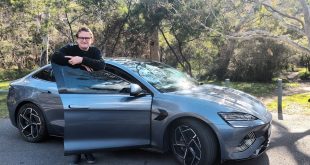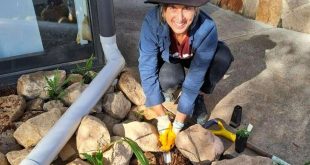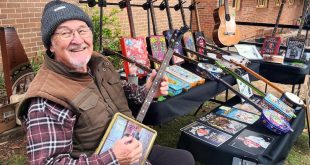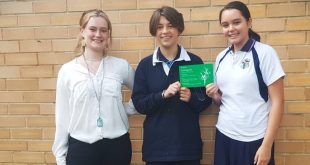
Claire Meijnderts, a devoted ‘Mum’ to hundreds of children. (Photo: Julie Nance)
Story by Julie Nance
For two decades Claire Meijnderts of Blaxland has been a beacon of hope for children facing the challenges of having incarcerated parents. As a tireless volunteer leader of Camp for Kids, she has helped transform hundreds of lives and played a pivotal role in steering young people away from the justice system. While raising her family alongside husband Jeff, Claire has been a devoted foster Mum and has worn many other volunteer hats.
Key Points:
- There are an estimated 60,000 children under 16 years of age in New South Wales who have experienced parental incarceration; at least one in five are Indigenous children. The children of incarcerated parents face family instability and risks of criminality similar to those of their parents before them. (Source: Children of incarcerated parents: Insights to addressing a growing public health concern in Australia.)
- Claire helps break the generational cycle by giving children of prisoners aged 8 to 12 a safe space to have fun, connect with peers in similar situations, and gain positive role models to look up to.
With each passing day at camp, the children grow in confidence. There’s lots of laughter, friendship and newfound hope. As a leader of Camp for Kids, Claire witnesses children gaining a sense of belonging, while learning valuable interpersonal skills and problem-solving alternatives to “hitting out”. Through volunteers like Claire, they discover their stories matter and that healing is possible.
“The benefit of camp is that every child has a similar background; they’ve all got a parent or both parents in prison and that’s unique,” Claire says. “They can’t go to school and talk about it. They carry a lot of shame and guilt that is not theirs to carry. They are in fact victims of their parents’ decisions.”
Camp for Kids is one of the many Christian-based programs funded by Prison Fellowship Australia, a not-for-profit organisation that supports men and women in prison and their families. The camp offers children opportunities for growth and personal development, with lots of fun in the mix. Flying foxes, abseiling, billy cart making, art and craft, cooking and team challenges are just some of the activities on offer.
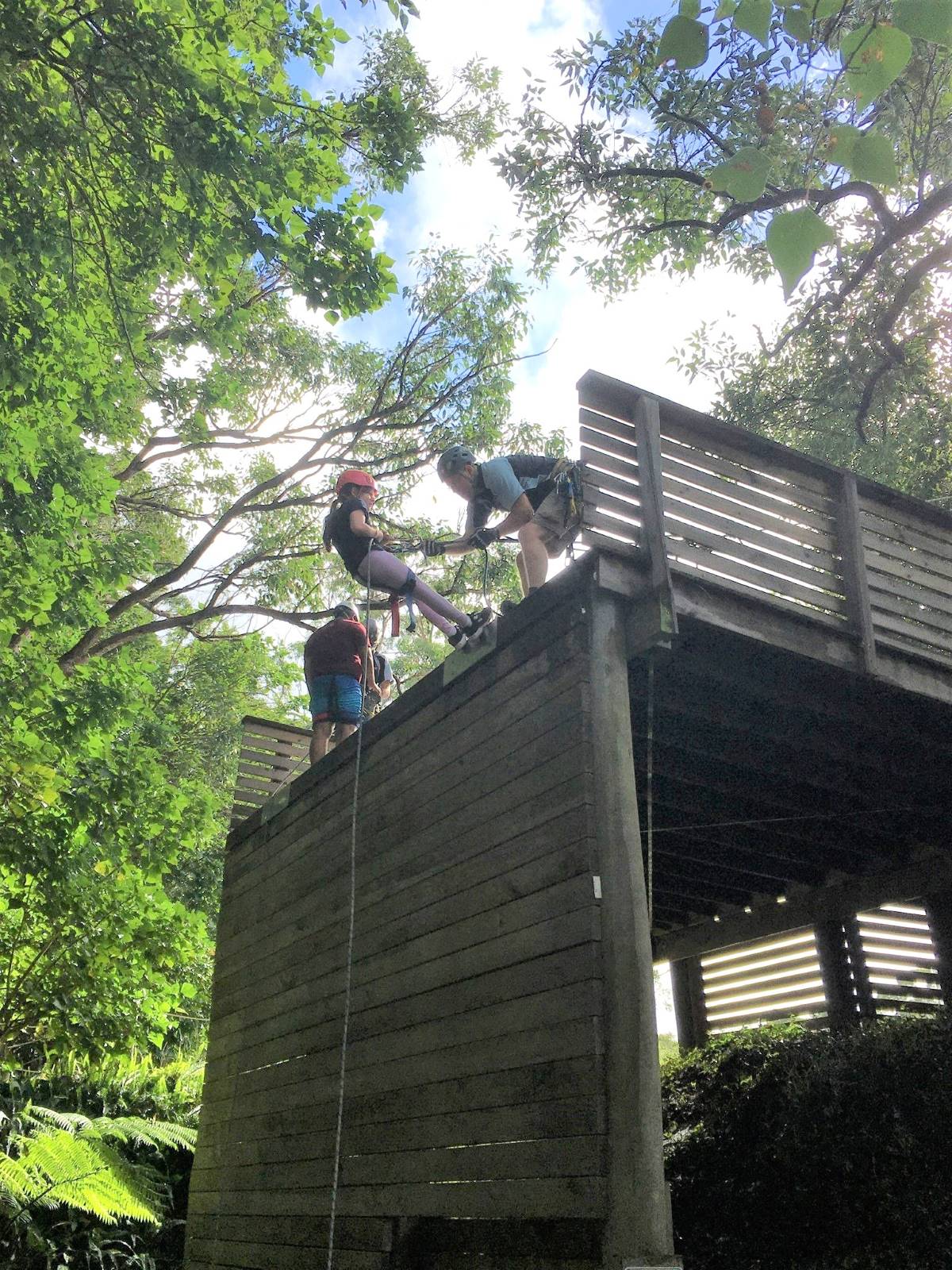
An abseiling challenge. (Photo supplied)
The journey from a gift to camp
Each year Prison Fellowship Australia invites inmates to take part in Angel Tree, a program that provides birthday and Christmas presents for their children. Last year, with support by churches and input from prisoners, 795 children across NSW received a gift at Christmas, with a note from their incarcerated parent. The children were then invited to take part in Camp for Kids.
Steve Farr, NSW/ACT State Manager for Prison Fellowship Australia, says Claire has been a key player in Camp for Kids’ success. He is currently fundraising to allow the expansion of the program through Regional NSW.
“We want to build on the foundation Claire has laid and amplify her work so more children can attend camp and be mentored,” Steve says. “Claire has the stability and maturity that makes her an amazing ‘camp Mum’.”
Steve says many of the children who attend camp are not used to walking into an environment where they are valued, encouraged and championed. “We aim to connect these kids with mentors who become buddies and have the chance to go on a journey with them,” he says.
Each year the camp is run at a different location, including in the Blue Mountains and on the Central Coast.
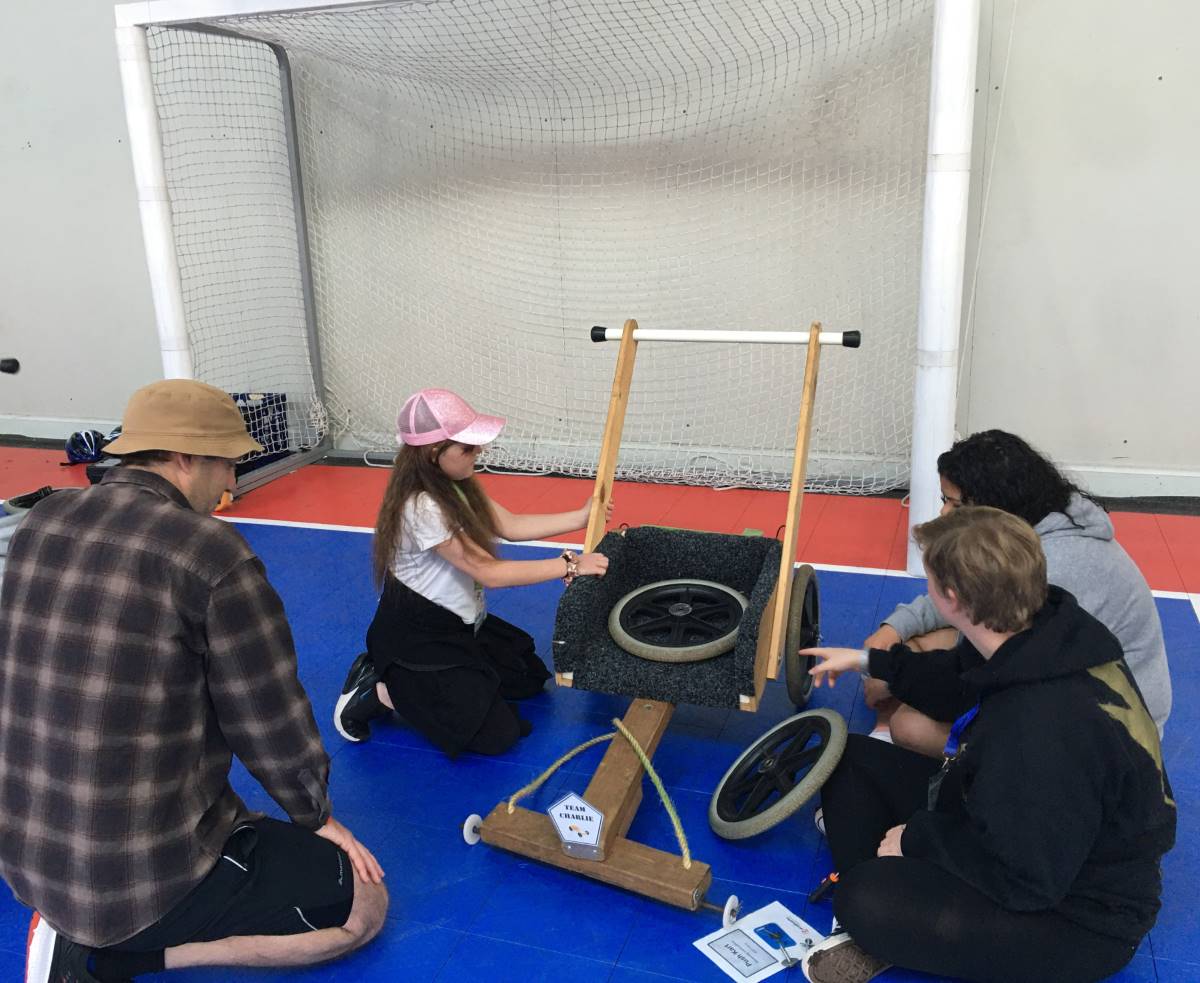
Building go-karts is a great team-building activity. (Photo supplied)
Claire says the majority of camp attendees are cared for by grandparents, another relative or are in foster care. They often have a history of broken relationships, being moved from home to home from a young age.
“There’s uncertainty for them around where they’re going to go next or how long they’re going to be there, which then impacts their schooling and their learning ability,” Claire says. “They become more anxious or can’t concentrate because they’re always focusing on those other elements that are more important to them; their stability and security in life.”
Many children have behavioural issues, mirroring violence they have witnessed or experienced themselves. At camp the ratio is two adults per child. Learning how to peacefully deal with issues is an important part of the program. Children listen intently to guest speakers who have travelled down similar, challenging roads in the past.
Claire says she is moved by the stories children share with her and their peers. There are tales of traumatic home lives and matter-of-fact mentions of crimes committed by their parents. Murder, robbery and drug-related offences are part of their vocabulary.
“It’s very humbling that you’re trusted with such a story when you think we only see them four days a year,” Claire says.
You’ve got to be strong for the kids, but I go to bed at night sometimes and I’m bawling. You wonder ‘how can this happen to these kids and their families?’ – Claire Meijnderts
With the camp’s cut-off age of 12, Claire says there is a lot of emotion involved when children are no longer able to attend. To address this, she introduced a Junior Leader program where selected young people are mentored by adults and help run games and other activities.
“Our Junior Leader program started getting a roll on and we had up to 30 junior leaders,” says Claire, who fundraises in her spare time to buy gifts for the kids. “We still get many of those junior leaders back as adult volunteers now.”
Claire says it’s a real joy to hear the choices young people make as they navigate their way into adulthood.
“It’s great to hear they are working now, they’ve got their own place or they’ve got their own children,” she says. “It’s just nice to hear they’re on the straight and narrow because the whole purpose of the camp is to try and break the cycle so that these kids don’t end up following in their parents’ footsteps into that system. We hear very few kids that have been through camp that have actually ended up in the system which is awesome.”

Claire’s daughter Sarah preparing gifts for camp (photo supplied).
As part of the mentorship aspect of the camp, many of the children have kept in touch with Claire over the years. Amongst the former camp attendees is a chef, a hairdresser, a McDonalds manager and a gym fitness worker.
Called to be a foster Mum
Bringing up four children with Jeff in the Blue Mountains, Claire always felt drawn to ads calling for foster carers. Once their own brood was older, with only two left at home, the couple started providing respite care to children with disabilities, for Anglicare. After a year of training, they became qualified foster carers.
“When you get to the teenage years, it’s very hard to find long term foster homes,” Claire says. “Amy joined our family at the age of 12 and she is now 25. One weekend became school holidays, became one school term and then it was permanent.”
Claire admits fostering requires a great deal of patience and comes with a lot of challenges. However, she stresses it is also very rewarding: “I get beautiful Mother’s Day cards from Amy saying ‘you’re the best mum in the world’.”
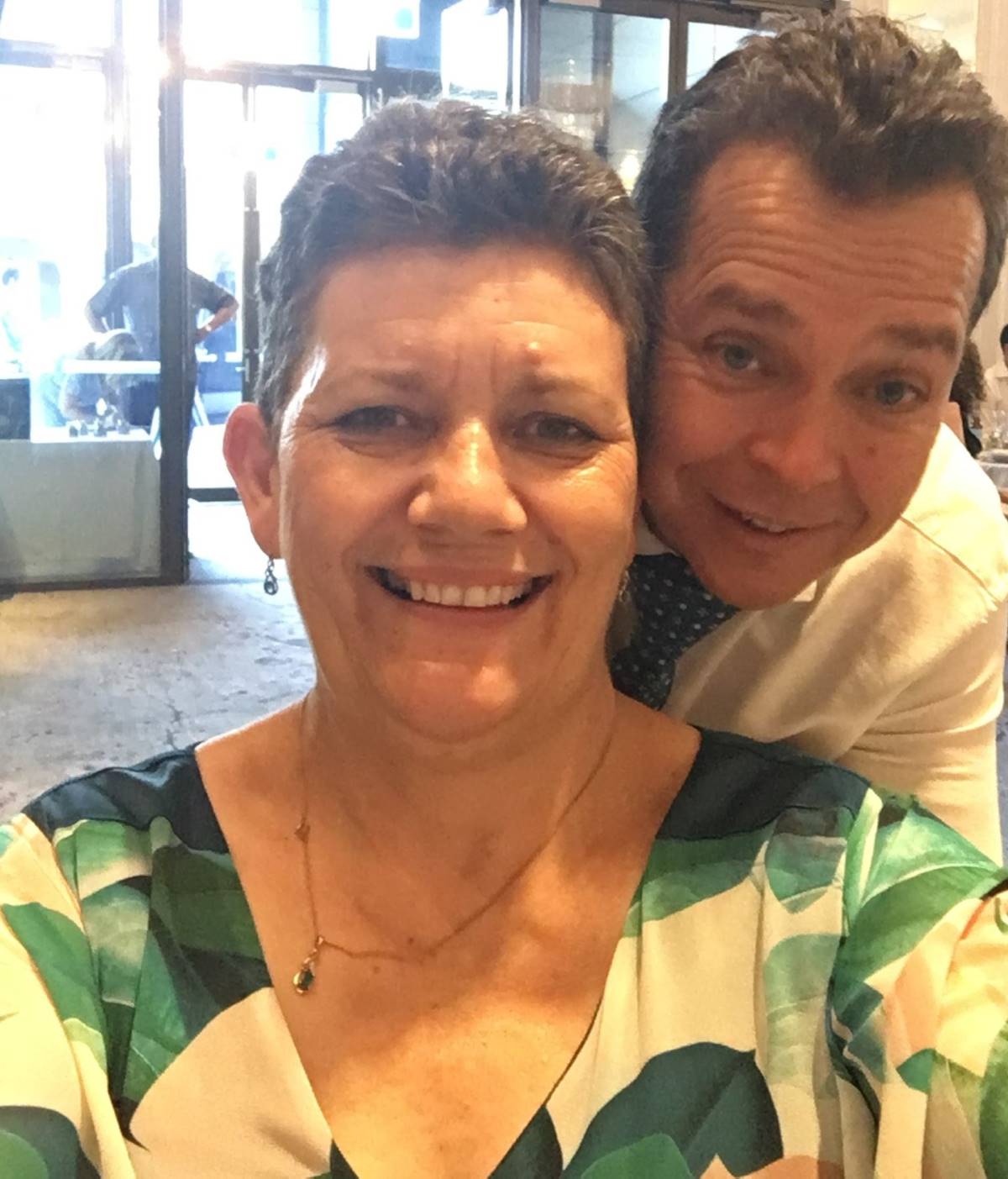
Dynamic duo Claire and Jeff. (Picture supplied).
Reflecting on a life of volunteering
Claire is a modest person and unless prompted, she wouldn’t have mentioned her other volunteer gigs on top of her Camp for Kids’ commitment.
“My whole life has been volunteering because I haven’t had a career,” she says. “Whether it was running a playgroup, being on the committee at preschool, running the school canteen, I’ve always done that sort of thing. At the moment I visit elderly people in nursing homes with Belong Blue Mountains. There’s always needy people out there that need something. I just feel that’s where I can give.”
Take Action:
- Prison Fellowship Australia needs to raise $60,000 to fund a part-time worker to run ‘Extraordinary Lives’ that includes the Camp for Kids program. If you want to help more children of prisoners have a brighter future, donate here, phone Steve Farr on 0418 167 557 or email steve.farr@prisonfellowship.org.au
- Volunteer for one of the many programs run by Prison Fellowship Australia https://prisonfellowship.org.au/volunteer/
Share this article:
This story has been produced as part of a Bioregional Collaboration for Planetary Health and is supported by the Disaster Risk Reduction Fund (DRRF). The DRRF is jointly funded by the Australian and New South Wales governments.
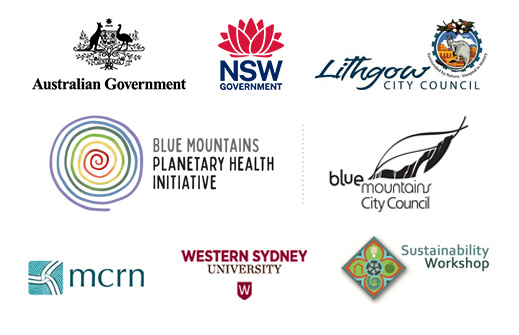
More from around the region
The fabulous Gang Gang Farmers Market in Lithgow will be back when the weather warms up. Meet some stallholders and whet your appetite for their Spring re-opening in Lithgow Area Local News (link in profile)
https://lithgowlocalnews.com/gang-gang-farmers-market/
#markets #lithgow #localproduce #planeteryhealth #buylocal
Imagine having enough absorbent green spaces, water tanks and underground water storage to capture the damaging stormwater that runs off hard surfaces in extreme wet weather events; imagine having enough stored water and the ability to clean all the water we use so that we are prepared for future drought and fire seasons. Join the discussion about how we can do this at a Free Water Symposium on Friday 26 July at the Planetary Health Centre. Bookings essential (link in profile): https://www.eventbrite.com.au/e/future-proofing-with-circular-water-tickets-943977701717
#circularwater #greywater #blackwater #stormwater #waterrecycling #togetherwecan #disasterriskreduction #beprepared #extremeweather #planetaryhealth #bushfire #flood #drought
Beyond the Yellow Bin: Surprising Things You Can Recycle – and How to Do it!
Here’s a guide to help Springwood and Greater Blue Mountains residents access the most effective recycling options available in the local area. Read more in Springwood Area Local News (link in profile): https://springwoodlocalnews.com/recycling-in-the-blue-mountains/
#recycling #circulareconomy #reuse #reduce #recycle #bluemountains #springwood #planetaryhealth #togetherwecan
Hamish Dunlop interviews prize-winning children’s book illustrator, mother, activist and proud Bundjalung woman, Charmaine Ledden-Lewis about the power of storytelling and how we can inspire our children to build a better world. Read more in Blackheath Area Local News (link in profile): https://blackheathnews.com/charmaine-ledden-lewis/
#changethestory #abetterworld #powerofstorytelling #bundjalung #illustrator #firstnations #planetaryhealth #blackheath #bluemountains
Broken chair? Blown amp? Busted washing machine? They don’t have to be thrown away! These Mid Mountains fixers and makers will revive them. Read more in our Mid Mountains Repair Guide: Choosing Longevity in an Age of Disposability. You can find it in Mid Mountains Local News (link in profile): https://www.midmtnslocalnews.com/mid-mountains-repair-guide/
#repair #repairculture #fixing #reuserecycle #longevity #togetherwecan #thebigfix #planetaryhealth #midmountains #repairguide
In this video, Dharug artist Leanne Tobin talks eloquently about the critical importance of water and why it`s the theme of her two paintings in the Water for Life exhibition at the Blue Mountains Planetary Health Centre. View the paintings and learn more about the many ways we can work together to manage water better at our free Water Symposium next Friday 26th July. Bookings essential (link in profile): https://bit.ly/3LiuJWi
The full video can be viewed on our YouTube channel (link in profile)
#waterforlife #leannetobin #firstnations #waterissacred #planetaryhealth #watersymposium
Electric vehicles continue to grow in popularity across Australia, but many people are still uncertain about their benefits, feasibility, and availability. To try and help local communities in the Lower Mountains have a better understanding of what EV’s can offer, @parentsforclimatebluemountains are hosting an EV Showcase in Blaxland on Saturday 27 July to help bust the EV myths and provide helpful, up-to-date and accessible information. 33 Hope Street Blaxland between 10 am and 12.30 Read more in Lower Mountains Local News (link in profile): https://lowermtnslocalnews.com/community-ev-showcase-blaxland/
#electriccars #blaxland #bluemountains #ev #planetaryhealth #towardszeroemissions
As part of our Water Demonstration Site at the Blue Mountains Planetary Health Centre we`ve installed a range of sprinklers to show people how to protect their homes from bushfire. Plumber Daniel Brown will be giving a tour at our upcoming event: Future Proofing with Circular Water on Friday 26 July. The event is free but bookings essential at https:bit.ly/4f78K1Z (link in profile) #bushfiresprinklers #beprepared #planetaryhealth
Global problems are creating renewed interest in traditional DIY skills like sewing. Here’s how a local grandmother is sharing her rag trade experience to make a difference and how you can get involved. Read more in Katoomba Area Local News (link in profile): https://www.katoombalocalnews.com/upcycling-fashion-workshops/
#skillshare #givingback #sharing #upcyclingfashion #sewing #patternmaking #repair #clothingadjustments #wastereduction #textilewaste #creativity #planetaryhealth
Calling all plumbers, builders, architects, engineers and any community members interested in learning ways we can manage water to reduce the impact of future droughts, floods and fires. On Friday 26 July we`ll be bringing together leaders in bushfire sprinkler system design, Hydraloop technology which can recycle 40% of your greywater, the program manager for drought from Sydney Water, and the designer of our 150,000l underground water storage system which will be capturing and cleaning stormwater for firefighting as a model for what we could build at the end of flame zone streets. Speak to a plumber about installing tanks and water systems and be in the running to trial one of two free Hydraloops we have on offer. This grant-funded event is free but bookings essential (link in profile):
https://bit.ly/4f78K1Z
This event is being supported by the Disaster Risk Reduction Fund which is funded by the Australian and New South Wales governments.
@hydraloop_systems @sydneywater @nswreconstructionauthority #greywaterrecycling #watertanks #firefighting #beprepared #drought #fire #flood #heatwave #bushfiresprinklers #planetaryhealth #disasterriskreduction
Our fortnightly Planetary Health Newsletter shares news about upcoming events, like our free Water Symposium on Friday 26 July, and stories from the Lower Mountains to Lithgow that are jam-packed with inspiration and a blueprint for the way forward.
Read it here and subscribe via any of our news sites (links in profile):
https://bit.ly/4cXQg2f
In this edition:
Katoomba Area Local News: Learning How To Upcycle Fashion with Sherlie McMillan
Mid Mountains Local News: Mid Mountains Repair Guide: Choosing Longevity in an Age of Disposability
Blackheath Area Local News: Charmaine Ledden-Lewis on Stories for a New World
Lower Mountains Local News: Busting The EV Myths: Community EV Showcase & Information Event Comes to Blaxland
Springwood Area Local News: Beyond the Yellow Bin: Surprising Things You Can Recycle – and How to Do it!
Lithgow Local News: The Gang Gang Farmers Market will Return in Spring!
#planetaryhealth #systemicchange #togetherwecan #solutions #constructivejournalism #watersymposium #hyperlocalnews
What an inspiring day at the Planetary Health Centre yesterday! We launched the Planetary Health Storytelling Network after a brilliant workshop with award-winning health writer and author Sophie Cousins on Our Community, Our Stories: Writing for Change. The Network will include all types of storytelling for planetary health: from songwriting to video, creative non fiction and visual arts. We`ll be having our first reading by Lorraine Shannon on the theme of GARDENS at 6.30pm on Thursday 8 August. All welcome to come along and share. SAVE THE DATE!
#planetaryhealth #changethestory #togetherwecan #storytelling #storytellingforchange #planetaryhealthstorytellingnetwork


